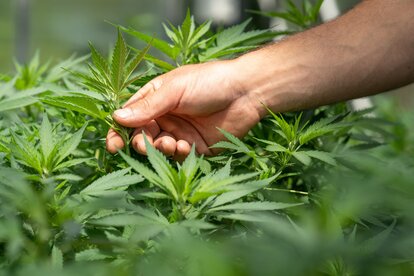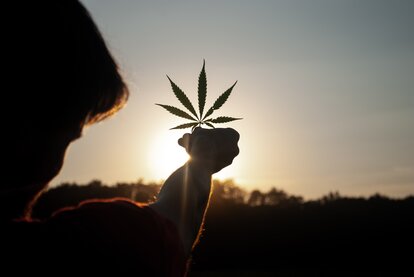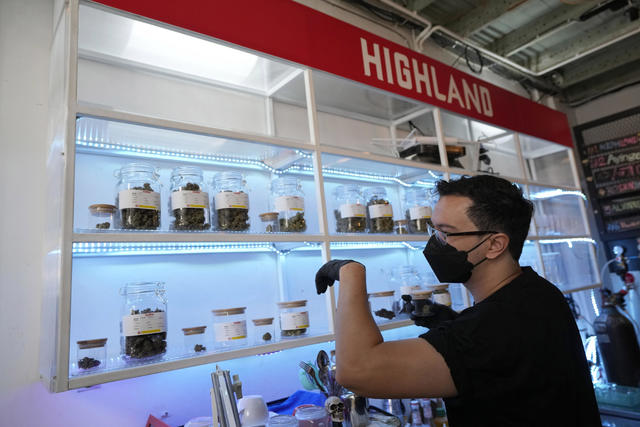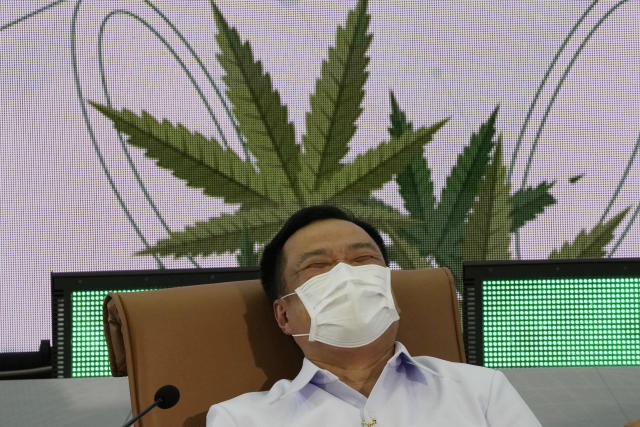Thailand Decriminalizes Marijuana
The government has removed cannabis from the list of prohibited narcotics in an effort to help the country's struggling economy. However, the legality around the recreation use of marijuana remains entirely murky.
One gram of the cannabis strain UFO costs the equivalent of just over 10 euros. The price list of the "Highland Cafe" in Bangkok also promises the customer the effect of the drug: "Chill Alert".
The "Highland Cafe" in Bangkok is one of the first shops in Thailand to officially sell cannabis flowers. Others are likely to follow in the coming weeks and months.
On 9th of June, cannabis is no longer on Thailand's list of prohibited narcotics since the cabinet’s decision in December. The government aims for a special kind of economic stimulus programme - especially for tourism and agriculture.
Officials are trying to make cannabis popular as a crop: the state will now distribute one million plants to its citizens, Health Minister Anutin Charnvirakul promised on his Facebook page.
While the German government is still discussing how and in what form cannabis should be legalised as a stimulant, Thailand is becoming a marijuana pioneer. Although officially only through consumption for medical purposes is allowed, the "Highland Cafe" certainly has other target groups in mind. One thing is clear; in the restrictive Southeast Asia Region, Thailand stands out with its relaxed policy on cannabis.
Further restrictions
In the future, citizens will be allowed to grow as much cannabis and hemp as they want. All they have to do is register via the app "Plook Ganja" (roughly: plant ganja) or through a government website. Only those who want to market their harvest commercially still have to apply for a permit.
However, it remains unclear how Thailand intends to regulate consumption: Anutin and his officials affirm that cannabis shall only be used for medical purposes - and for cooking. Where exactly does the distinctive usage lies, however, is not yet clearly defined.
Extracts, for example oils, that contain more than 0.2 % of the psychoactive substance tetrahydrocannabinol (THC), is still classified as a prohibited narcotic in Thailand. By comparison, street-traded marijuana in Germany contains more than 10 percent THC on average. The cannabis-containing products now available in Thailand will therefore not cause intoxication. Products with a THC content of 0.2 percent are already available in Germany.
Thailand still has to decide, for example, whether the consumption of THC should only be allowed at home or also in cafés and restaurants. One thing seems clear: smoking the weed will probably not be allowed for the time being, at least not in public. Otherwise, the consumer can be held accountable for odour nuisance.

Person holding grass during daytime.© CRYSTALWEED cannabis
Cannabis expected to support medical tourism
Experts warn that the legal limbo could get consumers into trouble. "There is no mention of limits on use or drug-impaired driving laws", says Sarana Sommano, agriculture expert at Chiang Mai University. "This could be a mistake by the government in trying to rush out its policy to please voters without really planning the details and explaining to the public on what's going on."
At least regionally, the government is considering legalising recreational consumption. However, those places would still need to be specified, said Paisarn Dunkum, secretary-general of Thailand's Food and Drug Administration. Coffee shops such as those seen in the Netherlands are unlikely, however.
The government wants to prevent the use of cannabis as an intoxicant, but at the same time provide the desired economic impulses - after all, the relaxation is primarily for economic reasons. Cannabis advocates are proclaiming the plant a cash crop. At the forefront is Health Minister Anutin.
He toured Thailand's provinces for several days in March this year, promoting the cultivation and use of the long-banned plant. The highlight of the trip was Nakhon Phanom, capital of the province of the same name in north-eastern Thailand. Anutin wants to turn the provincial town into a model city - the "Cannabis City". In the future, Tourists in Nakhon Phanom will be able to learn about the plant and how it can be processed.
Thailand had already permitted the medicinal use of the plant in 2019. Then, at the end of 2020, the cannabis plant was removed from the narcotics list except for the so-called buds and flowers. Entrepreneurs quickly saw opportunities: products containing cannabis are now available in Thailand in many forms, not only as medicine but also in food.
The "Asian Cannabis Report" by the cannabis consultancy Prohibition Partners estimates that the legal cannabis market in Asia can grow to 12.5 billion USD by 2024. Cannabis could especially save Thailand's important economic sectors of agriculture and tourism.
Thailand's agricultural sector is not only struggling with labor shortages, but also with low profit margins from important jasmine rice exports. Competing cultivation countries like Vietnam have become strong rivals. Tourism is also in crisis. International visitor numbers have plummeted during the pandemic and are slow to recover. The relaxed cannabis policy is now intended to boost medical tourism in particular.
Germany plans law by spring 2023
According to Anutin, over 240,000 patients had been treated with medical cannabis by March 2022, generating nearly 200 million euros of revenue. In cannabis medicines, the THC content can also be higher than 0.2 per cent. Meanwhile, certain THC-containing medicines are even on Thailand's list for "essential medicine" and can be prescribed free of charge under public health insurance by hospitals or one of the now more than 1000 "marijuana clinics" to patients such as cancer patients.
Considering the conservative nature of Southeast Asian governments, Thailand stands out. In Singapore and Malaysia, long prison sentences are imposed for possession of small amounts of cannabis. Those who traffic in the plant and its products can even be executed. In Singapore, a man was sentenced to death as recently as 2021 for bringing a kilogram of cannabis into the country.
Germany plans to go further than Thailand in legalising cannabis use. Medical cannabis may already be prescribed by a doctor since 2017. Here, the health insurance also pays under certain conditions. The German government now plans the "controlled dispensing of cannabis to adults for consumption purposes in licensed shops", as it stipulated in the coalition agreement.
Federal Minister of Justice Marco Buschmann is sticking to the plan: The sale of legal cannabis for recreational use is to become a reality. "It is realistically possible to implement the law by spring 2023. We are trying to get it done even sooner," he tweeted in May.
Leon Wiedenhöfer is an intern in the Friedrich Naumann Foundation's Thailand project. He is studying political science at Goethe University in Frankfurt.

A person holding a cannabis leaf in the midst of a breathtaking sunset










 A worker tends to cannabis plants at a farm in Chonburi province, eastern Thailand, June 5, 2022.SAKCHAI LALIT/AP
A worker tends to cannabis plants at a farm in Chonburi province, eastern Thailand, June 5, 2022.SAKCHAI LALIT/AP







